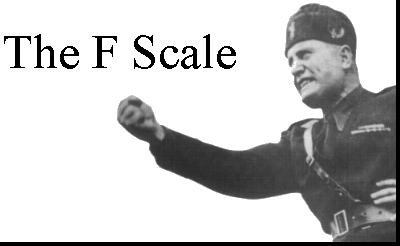 Many have linked political conservatism with “the authoritarian personality,” which, in part, involves the willingness to view power structures as legitimate, less reluctance to submit to those in authority over you, and an increased tendency to exercise authority over the less powerful. Social media is often seen as counter-authoritarian, however, we also have good evidence that the Web in general, and social media in particular, also replicates existing power structures.
Many have linked political conservatism with “the authoritarian personality,” which, in part, involves the willingness to view power structures as legitimate, less reluctance to submit to those in authority over you, and an increased tendency to exercise authority over the less powerful. Social media is often seen as counter-authoritarian, however, we also have good evidence that the Web in general, and social media in particular, also replicates existing power structures.
With these different concerns in mind, we might wonder if those with different political orientations use social media for politics in different ways. More specifically, are those on the right, even in a social media environment that permits more expression, voice, and creativity, more likely to submit and follow? Theodore Adorno, pictured above and pioneered work in this line of thought, I think, would predict that Republicans would be more passive, more likely to listen and restate, whereas those on the left would be a bit more likely to create new content.
I post these very brief thoughts (certainly much more would be needed to substantiate the sweeping claims I just made above; this is only a short blog post!) because The Pew Internet in American Life Project just today released some new findings on Social Media and Political Engagement [pdf]. Here are most of the findings:
- 38% of those who use social networking sites (SNS) or Twitter use those social media to “like” or promote material related to politics or social issues that others have posted. Liberal Democrats who use social media are particularly likely to use the ‘like’ button—52% of them have done so and 42% of conservative Republicans have also done so.
- 35% of social media users have used the tools to encourage people to vote. Democrats who are social media users are more likely to have used social media to encourage voting—42% have done that compared with 36% of Republican social-media users and 31% of independents.
- 34% of social media users have used the tools to post their own thoughts or comments on political and social issues. Liberal Democrats who use social media (42%) and conservative Republicans (41%) are especially likely to use social media this way.
- 33% of social media users have used the tools to repost content related to political or social issues that was originally posted by someone else. Republican social media users are more likely to do this on social media —39% have used social media to repost content, compared with 34% of social media using Democrats and 31% of independents.
- 31% of social media users have used the tools to encourage other people to take action on a political or social issue that is important to them. Some 36% of social-media-using Democrats have done this as have 34% of Republicans. This compares to 29% of independents who are social media users.
- 28% of social media users have used the tools to post links to political stories or articles for others to read. The social media users who are liberal Democrats and conservative Republicans are the most likely to have used social media this way (39% and 34% respectively).
- 21% of those who use SNS or Twitter belong to a group on a social networking site that is involved in political or social issues, or that is working to advance a cause. There are no major differences by ideology or partisanship when it comes to using social media this way.
- 20% of social media users have used the tools to follow elected officials and candidates for office. Some 32% of the conservative Republicans who use social media follow officials on social media and 27% of liberal Democrats who use social media do so.
The main finding, I think, is that those more politically extreme, right or left, are more likely to use social media for civic or political reasons. However, these active political social media users differ from right to left. While much of the behavior is similar, Democrats are found to be more likely to use the “like” button for political material and to use social media to encourage others to vote. Republicans are found to be more likely to use social media to repost someone else’s content as well as “follow” elected officials and candidates for office.
These last two points get at political behavior that is more about listening and restating someone else’s content is more associated with the political right, whereas measures that focus on creating unique content are more balanced or lean a bit left. This is only one survey, so I want to recognize that it would be a stretch to draw strong conclusions here. However, this does mesh with previous research that has linked political conservatism with “the authoritarian personality” (e.g., see Bob Altemeyer’s terrific work).
On the other hand, we should recognize that the main measure of creating new content did not point strongly to the left or the right. Further, even these so-called ‘passive’ (to be clear, *I’m* the one calling these measures “passive”, not Pew) are not completely passive. “Following” someone on Twitter, for example, is indeed about listening and consuming content, but I’ve always thought “follower” is an unfortunate term. One can “follow” someone without passively consuming their content; one can disagree and do many active, productive, things like comment, favorite, retweet and so on. Further, the percentage-differences, between around 5-10%, are, in my opinion, substantive, but certainly not massive.
All that said, I do think this points to some interesting research questions for future thought. I’m especially interested in the idea that, when encountering political content, liberals are more likely to “like” whereas conservatives are more likely to share or repost. What is behind that? Is it that those on the left, whom are more anti-authoritarian, feel that simply reposting content is a threat against their autonomy? Both a “like” and a repost help perform the political-identity we want to construct, to demonstrate our individuality, however, a repost is also about submitting one’s identity performance to the words of another.
Last, since I’m being so speculative here, I’d appreciate if any readers could point me to more formal research on this topic in the comments. Thanks!


Comments 3
tomslee — October 19, 2012
No constructive suggestions, but...
I cannot tell if the Pew results are controlled for age. I would think that habits such as like vs repost are ones we absorb from our cohort, and if there is a young/left vs old/right slant to the respondees then that might be as much to do with it as anything.
Also, I strongly dislike the idea that listening = passive. Some of us, myself included I think, like to read/listen/reflect a lot before saying things (odd blog comments like this one don't count!) and are a bit slower than others to respond to events with opinions. But that doesn't make me passive, I hope.
Naomi Most — October 19, 2012
Content-production doesn't necessarily indicate independent thought.
Liberals tend to want to appear to be independent thinkers, that seems to be true. But the performance of independent thought does not a divergence from authoritative belief make.
Do Republicans Use Social Media More Passively? « n a t h a n j u r g e n s o n — October 30, 2012
[...] This post originally appeared on Cyborgology – read and comment on the post here. [...]